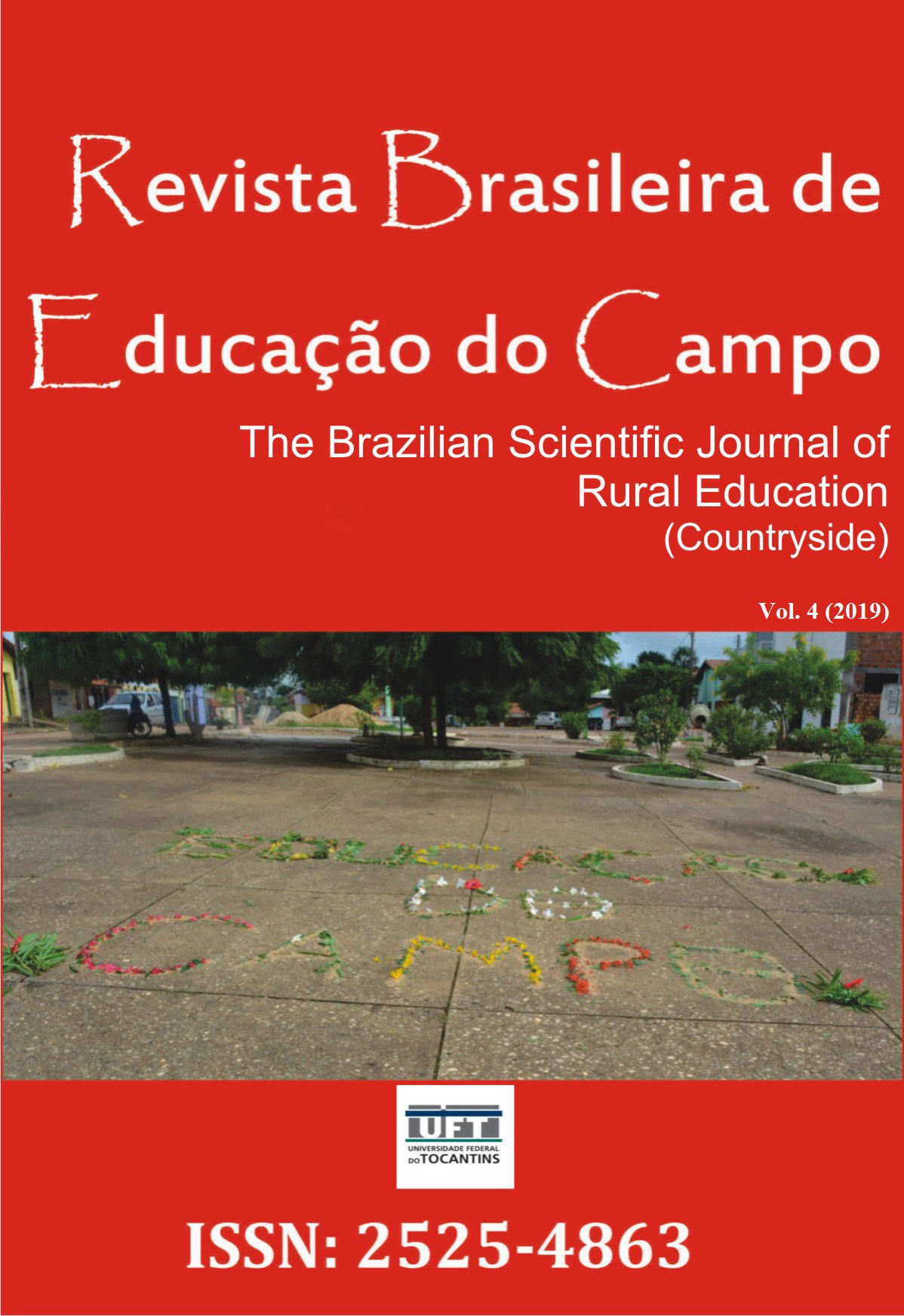Environmental awareness of EJA students from a multi-series room at the Porto Esperança Settlement Project in Confresa-MT
DOI :
https://doi.org/10.20873/uft.rbec.e4860Résumé
ABSTRACT. This study presents the results of a pedagogical intervention aimed at promoting environmental awareness among students of a multi-tiered Youth and Adult Education (EJA) room and discuss alternatives in the quest for sustainability. Its objective was to develop reflections, debates and actions that sensitized these students on environmental issues and sustainable practices. This intervention was developed during the year 2016 and involved a room with students from the 1st and 2nd year of EJA High School. One peculiarity of this extension room is that it is owned by Waldir Bento da Costa State School, located in the district of Veranópolis, municipality of Confresa-MT. For that, research was done on the subject, field classes, lecture, reading of texts and group discussions in order to socialize their conceptions about the theme and the practices they experience. Some instruments of data collection were the essay texts that produced, the participant observation and the logbook record. Students have shown concern for the environment and will seek to practice sustainable actions in their daily practices. In this way, it is possible to perceive that inserting the environmental theme in the EJA of a rural school is a necessity and that this training will be more successful if it is focused on issues of everyday life and the balanced relationship with the environment.
Téléchargements
Références
Andreola, B. A. (2000). Interdisciplinaridade na obra de Freire: uma Pedagogia da simbiogênese e da solidariedade. In Streck, D. R. (Org.). Paulo Freire: ética, utopia e educação (pp. p. 67-94). 3.ed. Petrópolis: Vozes.
Arroyo, M. (2006). Formação de Educadores de Jovens e Adultos. Belo Horizonte: Autêntica. SECAD/UNESCO.
Brasil. (2006). Caderno Trabalhando com a educação de Jovens e Adultos. Brasília: Ministério da Educação.
Brasil. (1988). Constituição: República Federativa do Brasil. Brasília: Senado Federal.
Brasil. (1996). Lei n. 9.394, de 20 de dezembro de 1996. Estabelece as diretrizes e bases da educação nacional. Brasília: Palácio do Planalto.
Brasil. (2012). Resolução n. 2, de 15 de junho de 2012. Estabelece as Diretrizes Curriculares Nacionais para a Educação Ambiental. D.O.U. no. 116, seção 1, p. 70, 18 jun. 2012. Brasília: Diário Oficial da União.
Freire, P. (2001). Pedagogia do oprimido. (31 ed). Rio de Janeiro: Paz e Terra.
Freire, P. (2005). A educação na cidade. (6 ed). São Paulo: Cortez.
Fajardo, E. (2003). Ecologia e cidadania: se cada um fizer a sua parte. Rio de Janeiro: Ed. Senac Nacional.
Gil, A. C. (2010). Como Elaborar Projeto de Pesquisa. (5 ed). São Paulo: Atlas.
Leão, M. F. (2014). Ensinar Química por meio de alimentos: possibilidades de promover Alfabetização Científica na Educação de Jovens e Adultos (Dissertação de Mestrado). Centro Universitário UNIVATES, Lajeado.
Leff, E. (200). Saber Ambiental: sustentabilidade, racionalidade, complexidade, poder. Petrópolis: Vozes.
Melo, J. R., & Rotta, J. C. G. (2010). Concepção de ciência e cientista entre estudantes do ensino fundamental. In Anais XV Encontro Nacional de Ensino de Química (XV ENEQ). Brasília: Sociedade Brasileira de Química
Santos, S. F., & Leão, M. F. (2017). Uso de objetos educacionais digitais para ensinar sistemas do corpo humano em uma escola do campo. Revista Brasileira de Educação do Campo, 2(3), 861-880. Doi: https://doi.org/10.20873/uft.2525-4863.2017v2n3p861
Sato, M. T. (2004). Educação Ambiental. In Selbach, S. (Org.). Arte e didática (pp. 36-45). Coleção Como Bem Ensinar/coordenação Celso Antunes. Petrópolis, RJ: Vozes.
Sauvé, L. (2005). Uma cartografia das correntes em educação ambiental. In Sato, M., & Carvalho, I. (Orgs.). Educação ambiental: pesquisas e desafios (pp. 17-44). Porto Alegre: Artmed.
Soares, L. (2008). Avanços e Desafios na formação do Educador de Jovens e Adultos adulto. Formação de educadores de jovens e adultos/organizado por Margarida Machado – Brasília: Secad/MEC/UNESCO.
Unesco. (2004). Educação de Jovens e Adultos: Uma memória contemporânea, 1996-2004. Coleção educação para todos. Brasília: UNESCO/MEC.
Téléchargements
Publié-e
Comment citer
Numéro
Rubrique
Licence
Proposal for Copyright Notice Creative Commons
1. Policy Proposal to Open Access Journals
Authors who publish with this journal agree to the following terms:
A. Authors retain copyright and grant the journal right of first publication with the work simultaneously licensed under the Creative Commons Attribution License that allows sharing the work with recognition of its initial publication in this journal.
B. Authors are able to take on additional contracts separately, non-exclusive distribution of the version of the paper published in this journal (ex .: publish in institutional repository or as a book), with an acknowledgment of its initial publication in this journal.
C. Authors are permitted and encouraged to post their work online (eg .: in institutional repositories or on their website) at any point before or during the editorial process, as it can lead to productive exchanges, as well as increase the impact and the citation of published work (See the Effect of Open Access).














